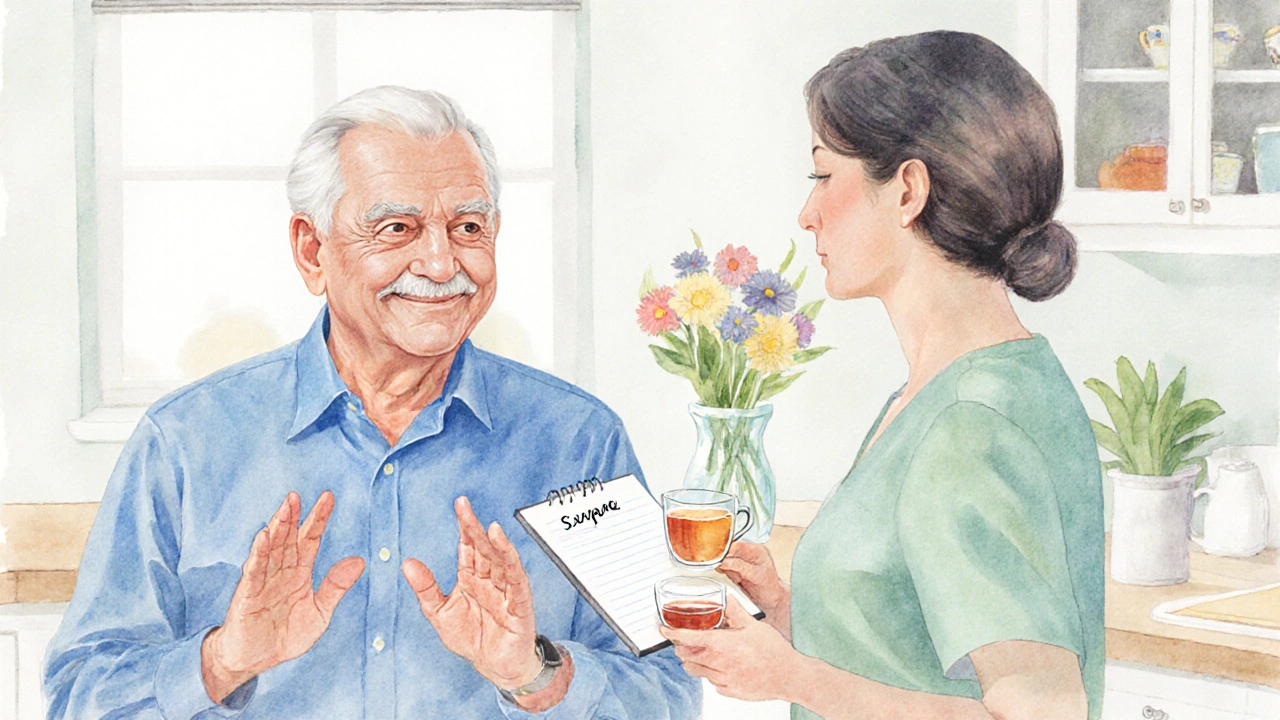How Alzheimer’s Dementia Affects Communication and Language Skills

Alzheimer's Communication Stage Guide
This interactive tool helps caregivers and family members understand how Alzheimer's affects communication at different stages.
Early Stage (Mild)
Occasional word-finding pauses, difficulty naming recent events.
Middle Stage (Moderate)
Frequent anomia, mixing up pronouns, trouble following multi-step directions.
Late Stage (Severe)
Very limited speech, reliance on non-verbal cues, possible loss of comprehension.
Communication Tips for Caregivers
When to Seek Professional Help
If the person starts misinterpreting safety-critical instructions - like "don't put the iron on" - it's time to involve a neurologist who can assess disease progression and discuss medication options. A referral to a speech-language therapist can provide individualized therapy and communication boards.
Quick Takeaways
- Alzheimer‑type dementia gradually erodes word‑finding, sentence construction, and conversational flow.
- Early signs include trouble naming familiar objects and mixing up pronouns.
- Mid‑stage patients may lose ability to follow multi‑step instructions.
- Speech‑language therapy and simple communication tricks can slow frustration for both the person and the caregiver.
- Professional help is vital once safety‑critical misunderstandings appear.
What Is Alzheimer‑type Dementia?
When Alzheimer-type Dementia is diagnosed, the brain’s hippocampus and cortical regions start losing neurons that store and retrieve memories. It is a progressive neurodegenerative condition that primarily impairs memory, reasoning, and, crucially for this article, language abilities. The disease does not strike all brain functions at once; language deterioration usually follows a recognizable pattern that caregivers can learn to anticipate.
Why Communication Takes a Hit
Language lives in a network of brain areas - Broca’s region for speech production, Wernicke’s area for comprehension, and the temporal lobes for word memory. Neurologist specialists track how Alzheimer‑type dementia disrupts these networks over time. As plaques and tangles accumulate, the pathways that let us retrieve words become sluggish, leading to pauses, misnaming, and eventually, word‑finding blocks that feel like sudden “brain‑fogs.”

Typical Language Changes
Researchers label many of these changes as a form of Aphasia a language disorder that can arise from dementia, stroke, or head injury. However, Alzheimer‑related aphasia differs because it worsens alongside memory loss. Common patterns include:
- Anomia: forgetting names of objects, people, or places.
- Semantic Paraphasias: substituting a related word (e.g., saying “dog” instead of “cat”).
- Reduced Fluency: shorter sentences, frequent pauses, and reliance on filler words like “thing.”
- Comprehension Gaps: trouble following complex questions or multi‑step instructions.
These symptoms aren’t random; they map onto disease stages, which we’ll explore next.
Stages of Communication Decline
| Stage | Common Language Issues | Helpful Strategies |
|---|---|---|
| Early (Mild) | Occasional word‑finding pauses, difficulty naming recent events. | Use visual cues, repeat questions, keep sentences short. |
| Middle (Moderate) | Frequent anomia, mixing up pronouns, trouble following multi‑step directions. | Write key points, break tasks into single steps, employ gestures. |
| Late (Severe) | Very limited speech, reliance on non‑verbal cues, possible loss of comprehension. | Use picture boards, focus on emotional connection, involve Speech‑Language Therapist a professional who tailors communication aids to the individual.. |
Practical Strategies for Caregivers
Most families feel helpless when familiar conversations start to feel like riddles. Below are real‑world tactics that work:
- Validate, don’t correct. If a loved one says “grandma” for “mom,” acknowledge the feeling behind the word rather than pointing out the mistake.
- Use the “one‑question‑one‑answer” rule. Ask only one thing at a time; follow up after they respond.
- Keep a “memory notebook.” Jot down favorite topics, names of friends, and recent events. Pull it out when conversation stalls.
- Leverage all senses. Show a photo, hand them an object, or use a scent to trigger the word you’re looking for.
- Consider technology. Simple speech‑generating apps let users select pictures that turn into spoken sentences.
These steps don’t cure the disease, but they preserve dignity and reduce daily frustration.
When to Call in the Experts
If the person starts misinterpreting safety‑critical instructions - like “don’t put the iron on” - it’s time to involve a neurologist who can assess disease progression and discuss medication options. A referral to a speech‑language therapist can provide individualized therapy and communication boards. Early professional input often slows the pace of language loss.

Frequently Asked Questions
Why does word‑finding become harder before memory loss is obvious?
The brain regions that store lexical information are among the first to accumulate Alzheimer plaques. Even when short‑term memory feels okay, the “dictionary” part of the brain is already lagging.
Can medication improve language abilities?
Cholinesterase inhibitors (e.g., donepezil) may modestly boost overall cognition, which can translate into clearer speech. They don’t reverse damage but can buy a few extra months of smoother conversation.
What if my loved one refuses speech therapy?
Start with low‑pressure activities: singing favorite songs, sharing family photo albums, or playing word‑association games. Therapy that feels fun is more likely to stick.
Are there specific foods that help language function?
A Mediterranean‑style diet rich in omega‑3 fatty acids, leafy greens, and antioxidants supports overall brain health. While no food can stop Alzheimer’s, nutrition can delay symptom progression.
How can I stay emotionally resilient as a caregiver?
Join support groups, schedule regular respite breaks, and practice mindfulness. Remember that communication is more about connection than perfect words.
Understanding the Alzheimer communication challenges equips families to respond with patience, tools, and timely professional help. While the disease will inevitably change how words flow, the heart of conversation - love, tone, and shared moments - can stay strong.

15 Comments
Honestly, this guide feels like a copy‑paste from any generic dementia site.
The intention behind the guide is noble, but the language sometimes slides into patronizing territory.
Caregivers deserve practical tools, not vague platitudes that sound like parental advice.
While validating feelings is important, we must also respect the autonomy of the person with Alzheimer’s.
Over‑simplifying can unintentionally strip dignity from those we aim to help.
A more nuanced approach would balance empathy with empowerment.
Reading through this, I’m reminded how language is really a shared experience, not just a one‑way street.
When words start slipping away, it’s the connection that keeps us anchored.
One thing that helped my dad was turning every conversation into a tiny ritual, like a shared cup of tea before discussing the day.
It gave him a predictable cue that eased the pressure of finding the right word.
Keeping sentences short isn’t about dumbing down; it’s about giving the brain space to breathe.
Gestures become a second language – a simple hand motion can say more than a tangled sentence.
Don’t underestimate the power of a familiar song; music often reaches parts of the brain that words can’t.
In the end, patience isn’t just a virtue, it’s a practical tool for both sides of the dialogue.
Let’s be real, the pharma-industrial complex loves to sprinkle a few "research‑backed" tips into these articles to keep the market humming.
While some of the advice is solid, remember that big‑name drug makers often fund the studies you’re reading.
The “memory notebook” trick is great, but who’s selling those fancy bound journals?
And those speech‑generating apps? Most of them monetize in‑app purchases that drain already‑stretched budgets.
Still, the core idea of using multi‑sensory cues is spot on – the brain is a pattern‑recognition machine.
If you can hack those patterns, you buy yourself some precious time before the next cognitive decline hit.
Totally get where you’re coming from, Troy – keep it simple and stay patient. 😊
Quick tip: a small sticky note on the fridge saying “Today’s meds at 9 am” can save a lot of confusion.
i think the guide is cool but kinda wimpy on the tech side lol
like, there are apps that actually talk back in real time, not just static pictures.
It’s helpful to see the step‑by‑step breakdown without the fluff
so many caregivers feel lost, this gives them a road map
Back home in Brazil we use a lot of music and family photos as cues – it’s like a cultural shortcut into memory.
Even a simple samba rhythm can spark a smile and a word that’s been buried.
Listen up – don’t wait until the crisis hits to act!
Get a speech therapist on board now, set up those boards, and train the whole family.
It’s not a nice‑to‑have, it’s a must‑have if you care.
From a clinical perspective, the article appropriately emphasizes early intervention, which aligns with current consensus guidelines.
Nevertheless, it could benefit from a more detailed delineation of evidence‑based speech‑language therapy modalities.
The inclusion of quantified outcomes, such as improvements in the Boston Naming Test, would strengthen its scientific rigor.
Furthermore, a discussion regarding the differential impact of pharmacological versus non‑pharmacological strategies would provide a holistic view.
Overall, the piece serves as a useful introductory resource for laypersons.
Great summary, really clear and straight forward. 👍
Alright, let’s dissect this piece with the rigor it desperately needs.
First off, the title promises a deep dive into the neurobiological underpinnings of linguistic decline, yet the content flirts with surface‑level advice that any teenager could conjure after a quick Google search.
The early‑stage description of “occasional word‑finding pauses” is so vague it could apply to anyone with a bad day, making it practically meaningless for caregivers seeking actionable insight.
Moving to the middle stage, the article blithely mentions “mixing up pronouns” and “trouble following multi‑step directions,” but offers no concrete strategies beyond the generic “write key points on paper,” which is a recommendation as stale as last year’s diet fad.
Even the suggested visual cues are introduced without a discussion of how to tailor them to individual patient histories, an oversight that betrays a one‑size‑fits‑all mentality.
Now, the late‑stage recommendations devolve into a laundry list of buzzwords – “picture boards,” “emotional connection,” “speech‑language therapist” – as if sprinkling jargon alone confers credibility.
The omission of any quantitative data, such as rates of word‑retrieval success post‑intervention, leaves the reader without a compass to gauge efficacy.
Furthermore, the article’s occasional forays into nutrition (“Mediterranean‑style diet”) are presented as afterthoughts rather than integrated components of a multimodal care plan.
One cannot overlook the glaring lack of diversity; all examples are anchored in a Western, middle‑class context, ignoring cultural variations in communication styles that could make or break therapeutic outcomes.
While the “Validate, Don’t Correct” mantra is well‑intentioned, it fails to address the fine line between validation and enabling dangerous misinterpretations, especially when safety‑critical instructions are at stake.
In short, the piece skirts the line between helpful hand‑holding and superficial checklist, ultimately falling short of the depth required for truly informed caregiving.
Future revisions would benefit from integrating peer‑reviewed studies, providing case‑specific protocols, and acknowledging the heterogeneity of Alzheimer’s trajectories.
Only then can it rise from a bland overview to a substantive, evidence‑based guide.
Interesting points, but remember every family’s dynamic is different.
Don’t force a one‑size solution on everyone.
Philosophically speaking, language loss challenges the very essence of self‑identity.
When we cling to the remnants of conversation, we are really holding onto the continuity of the person’s narrative.
It’s a reminder that communication transcends words; tone, rhythm, and shared history fill the gaps.
Thus, caregivers should cultivate an environment where silence is not a failure but a space for presence.
Sure, because “silence is golden” works perfectly when you’re trying to remember how to tie your shoes.